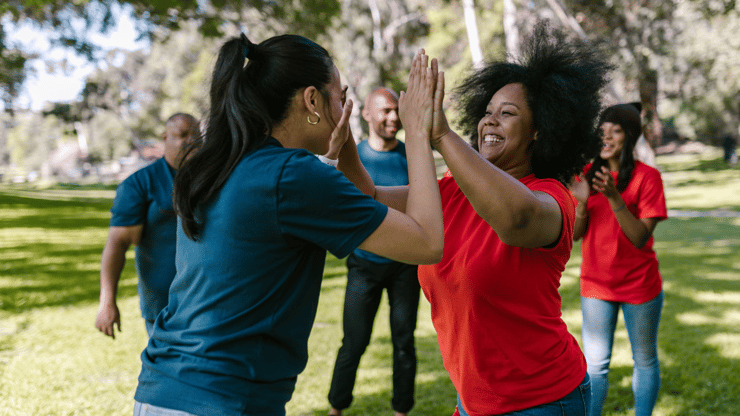
There are a lot of similarities when it comes to being a DPP lifestyle coach.
Everyone receives a similar training course to learn the material, works with a small cohort of DPP participants to help them prevent Type 2 diabetes, and implements a science-backed CDC-approved curriculum.
However, there’s one significant factor that makes how you coach your participants different from any other lifestyle coach — YOU!
You are a unique individual who has your own spin on how you have interpreted your source material, what you find effective in guiding your cohort, and what steps you coach your participants to take on their diabetes prevention journey.
To be the best lifestyle coach you can be, you must take some time to understand your coaching style and how that applies to the way you guide your group. Understanding your particular coaching brand will help you be authentic as you connect with your cohort and open more opportunities to engage with them personally as you deliver the coaching material.
At Realizing DPP, we want to give you the tools to not only instruct your participants but also to unlock your fullest potential as a lifestyle coach. That’s why we’ve compiled this article about understanding your personality type and different coaching style and how you can make a more significant impact when you find a strategy that blends the two.
We have a lot of great information to cover in this article, so let’s get started!
The Benefits of Understanding Your Personality Traits
If you’ve spent any time on social media at all, you’ve most likely come across personality tests.
It seems like everywhere you look, people are taking surveys that tell them what color they are, what movie character they act the most like, or what animal they reflect the traits of. They may seem like silly quizzes on the surface, but each questionnaire reveals a bit about that person’s personality.
You’re probably not going to decipher what coaching style is best for you by learning which star of Friends you’re the most like. However, there are many popular science-backed personality tests you can take to help you understand your leadership style and how you approach challenges.
One of the most popular personality assessments, DISC, utilizes a short assessment to divide personality types into four major categories. These general personality types help you better understand how you respond to different situations and the psychology behind your decision-making process.
How the DISC Personality Test Categorizes Different Personalities
The length and questions of a DISC assessment may differ depending on who administers the test and how in-depth the test results may be, but every test breaks personalities down into four major categories.
- Dominance: These are individuals who are more direct and results-oriented. They tend to be decisive in their leadership and don’t back down from competition.
- Influence: People in this category tend to be charming, optimistic, and persuasive. They like to motivate others through inspiration and encourage collaboration.
- Steadiness: Those in the steadiness category are understanding, patient, and sincere. They are often very consistent in the way they lead others and thoughtfully respond to challenges.
- Conscientious: This type of individual is analytical, diplomatic, and precise. Leaders in this category are very data-driven and like to implement measurable strategies.
Once you understand your personality type, you gain more insight into how you can maximize your impact through coaching. However, you shouldn’t look at your personality analysis and immediately assume what it says about you is a hard and fast rule.
You know yourself better than any test ever could, and it’s essential to understand that your personality may not fit into one particular box.
Different Coaching Styles You Can Use to Motivate Your DPP Participants
Now that we’ve taken a moment to cover different personality types and how they can help you better understand yourself, let’s look at a few common coaching styles.
It’s important to keep in mind that your coaching style will be as unique as you are — just like your personality type — but it’s beneficial to identify which coaching style you most align with. When you understand how you want to coach your cohort, it makes it easier for you to hone those skills and grow your impact as a coach.
One thing to keep in mind is that your coaching style is how you direct your coaching sessions toward an overall goal, not the techniques you use to teach your participants. For example, your style is how you help your participants meet their goals, not how you deliver the curriculum in individual sessions.
Although there are many different ways people define coaching styles, four of the more popular coaching styles include:
Performance Coaching
This coaching style focuses on improving your participant’s overall physical and mental performance. It encourages them to grow by looking at their current point and setting actionable steps to make self-improvements that reach their ultimate goal.
A great example of a performance coaching mindset is to help your participants not only set a particular weight loss goal but also to help them set progress marks of how they will meet their goals on their journey.
The key to performance coaching is that it goes beyond general encouragement and teaching of the curriculum. Instead, it narrows in on determining your cohort members’ strengths and weaknesses and creating a specialized strategy to help them maximize their progress on their diabetes prevention journey.
Mindset Coaching
Instead of focusing on your participants’ strengths and weaknesses, mindset coaching dives deeper into how your cohort members think. This coaching style helps people search within themselves to find the mental blocks that keep them from reaching their full potential and helps them reframe their thinking.
For example, your participants may feel unable to change their diet because they can’t overcome sugar cravings. To help them transform their thoughts around diet, you help them mentally access why they feel this way and help shift their negative mindset into a positive one.
Implementing a mindset coaching style helps your participants take a thought-forward approach to their diabetes prevention. This approach is beneficial because it helps your cohort adopt a can-do attitude that drives their diabetes prevention progress.
Holistic Coaching
The holistic coaching style approaches diabetes prevention by developing an understanding that everything is interconnected. When your participants make one healthy change, it affects other areas of their life. Holistic coaching highlights that all things are connected and focuses on your participants as whole people.
One great example of holistic coaching is teaching your participants about how a healthy diet changes more than just their metabolic intake and insulin resistance. Eating well also increases energy levels, which leads to a desire for more physical activity, which improves mental health and attitude.
When you implement a holistic coaching strategy, you help your cohort members look at how their diabetes prevention efforts affect more than one area of their life. This strategy helps them better understand how small changes in one area cause a ripple effect that spreads out to create significant results.
Mindfulness Coaching
Although mindfulness and mindset are similar, the two coaching styles differ in how they approach thinking. Rather than removing mental blocks, mindfulness coaching focuses on achieving a heightened sense of awareness so your participants can create a better mind-body connection.
For example, instead of identifying that they have bad habits they need to change, mindfulness coaching helps your cohort find why those habits exist. Maybe your participants started smoking to cope with stress in life, or they spend more time watching TV than they should because it gives them a sense of comfort. Once they identify the root of those issues, your participants can start reshaping their attitudes toward these habits and replace them with healthier habits that meet the same need.
Mindfulness coaching helps your participants take a deeper look inside themselves and make a better connection with their emotions. It helps people tear down the walls that prevent them from accessing their feelings and gives them the tools to reframe their attitudes so that they can make steps toward healthier choices.
How Your Personality Type Affects Your Coaching Style
We’re sure that you started noticing a trend as you read through the different DISC personality types and coaching styles — each personality type shares similarities with different coaching styles.
Coaches with more Dominance or Conscientious personality types may tend to lean more toward a performance style coaching because it focuses on overcoming obstacles and creates more data than other coaching styles. On the other hand, those with Influence or Steadiness traits may gravitate toward mindset or mindfulness coaching styles.
To determine your coaching style, take a moment to reflect on your most recent sessions with your cohort. What was your main focus? Did you dwell on the measurable results your participants could achieve? Or was your instruction directed toward helping them to unlock their potential?
It’s important to note that each coaching style has a different approach to how you teach diabetes prevention, but that doesn’t make one style better than the other.
Your Unique Coaching Style Doesn’t Need to Fit in One Box
Your coaching style — and your personality type — most likely won’t fit into one category, and that’s a beautiful thing!
You are an incredible, dynamic individual who is passionate about changing lives through diabetes prevention. Knowing your personality traits and analyzing coaching styles can assist you on your coaching journey, but you shouldn’t try to fit yourself into one box just because it sounds like the best plan for you.
As you continue to grow as a coach and gain more experience, your coaching style will develop in a way that is as unique as you are. Maybe right now, you’re focused on your group’s performance, but you may shift into a more holistic approach as they continue to make progress.
That’s more than fine!
Understanding what is working for you and your cohort is more important than knowing the theories behind your personality and why you should or shouldn’t coach in a particular way because of it. When you trust in yourself and allow room for growth, you’ll be the best lifestyle coach you can be.
Unlock Your Full Coaching Potential With the Realizing DPP Community
Knowing your personality type and coaching style can be great tools for helping you hone your coaching skills, but your coaching development will be more challenging without the proper support. Finding a dedicated coaching community can help you grow as a coach and provide the support you need to provide the best experience possible for your cohort!
Our community of present and past lifestyle coaches is just what you need to grow and learn more about techniques that can help you make a difference in your participants’ lives. We have a robust network of individuals who have answers to all of your coaching questions, on-demand webinars to help guide your journey, and live interaction with other like-minded coaches that you won’t get anywhere else.
Join the Realizing DPP community today to boost your coaching career!


